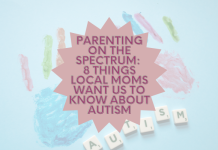Being a parent comes with no shortage of worries, concerns, and fears.
We constantly worry if we are doing enough, reading enough, hugging enough, feeding enough, and the list goes on.
As a mom of three, I’ve asked myself this with each child: is my baby on track speech wise?
I am lucky enough to have a younger sister that is not only the greatest aunt, but also finishing her masters in speech and language pathology, which for us means, no vowel or consonants gets uttered without her ear tuned into hear any variant.
As amusing as it sounds, it is also slightly relieving, especially as my older two prepared to enter their school years.
Read on to hear about the lessons I’ve learned in comparison after three kids.
xo,
Britt
My sister would constantly remind me that children don’t have to be perfect and once they enter kinder, a lot of the habits that they have learned in speech tend to fade away once they are around their peers.
Another kind reminder: Don’t compare your toddler’s speech progress with other kids. Each kid develops at different paces, and that’s okay!
One of the places that she loves to send parents as a reference for speech is ASHA.org also known as The American Speech- Language-Hearing Association they have tons of resources and studies to support parents looking for information.
Some of the age appropriate development advice that they suggest for the toddler years are as follows:
- Speak clearly to your child. Model good speech.
- Repeat what your child says to show that you understand. Add on to what she says. Use words like, “Want juice? I have juice. I have apple juice. Do you want apple juice?”
- It’s okay to use baby talk sometimes. Be sure to use the adult word too. For example, “It is time for din-din. We will have dinner now.”
- Help your child understand and ask questions. Play the yes–no game. Ask questions such as, “Are you Marty?” and “Can a pig fly?” Have your child make up questions and try to fool you.
- Ask questions that include a choice. “Do you want an apple or an orange?” “Do you want to wear your red shirt or your blue shirt?”
- Help your child learn new words. Name body parts, and talk about what you do with them. “This is my nose. I can smell flowers, brownies, and soap.”
- Sing simple songs, and say nursery rhymes. This helps your child learn the rhythm of speech.
- Place familiar objects in a box. Have your child take one out and tell you its name and how to use it. “This is my ball. I bounce it. I play with it.”
- Show pictures of familiar people and places. Talk about who they are and what happened. Try making up new stories.
Again, every child develops differently, and you know your child the best, if you ever feel that there is something concerning always, always, always speak to your child’s pediatrician.
Site manager Cara shared her speech therapy journey with her second child, including what to expect from a DES state evaluation, if your child does need support.










